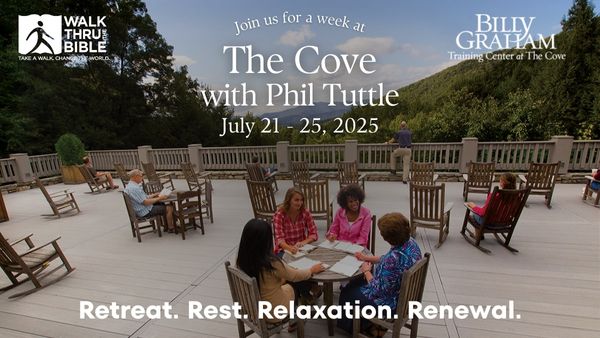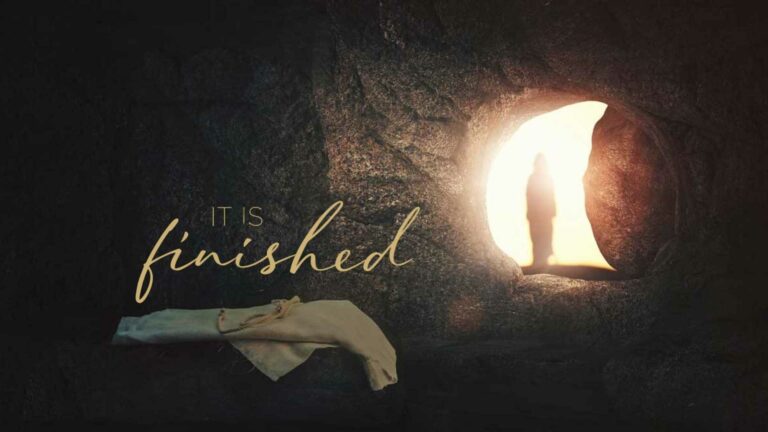
Join us at The Cove this Summer!
Join us for a week of teaching, time with God, fellowship, nature, and more at The Cove: A Billy Graham Training Center. July 21-25, 2025!
Read MoreJesus and the disciples were in a boat on the Sea of Galilee—that seemed to be one of Jesus’ preferred settings for teaching them lessons about faith—and a storm came up. A fierce storm, actually. It was violent enough that high waves crashed over the bow and filled the boat with water. Strong winds blew, the vessel bounced up and down on the waves, and in a startlingly absurd picture, one of the passengers slept on a cushion in the back. Jesus was apparently oblivious to the savage forces of nature.

Galilean fishing boats weren’t big. They didn’t have insulated cabins to block out the elements. In fact, they didn’t have cabins at all. Jesus would have been unable to avoid feeling the wind and the water, He would have heard the shouts of His friends, and He would have bounced on the waves as relentlessly as everyone else did. And somehow He slept.
Jesus’ complete disregard for the danger His friends faced bothered them. He wasn’t buying into their worry. In fact, He wasn’t even aware of it. It’s amazing that they had to wake Him, but they did—frantically. And when He sat up, they hurled an accusation at Him: “Don’t you even care that we are going to drown?” (Mark 4:38).
“Don’t you even care that we are going to drown?” (Mark 4:38).
Yes, this was the same Master who had spoken kind words and shown enormous compassion to them and others. Of course, He cared. But He looked like He didn’t. That made no sense. So they asked.
Calmly, Jesus got up and answered their question without actually answering it. He rebuked the raging elements, watched them calm down, and then turned to His panicky friends: “Why are you so afraid? Do you still not have faith in me?” (Mark 4:40).

These are pointed questions, and we know that if we were in the disciples’ situation, these questions would be pointed at us too. And who could blame us? Would anyone in his or her right mind assume everything was fine when a storm is about to sink a small boat and the one person who could offer help is asleep? It’s hard to imagine anyone joining Jesus in His nap in that situation. But that’s exactly what He expected them to be able to do—or at least to have the kind of attitude that would allow them to.
Our Subtle Accusation of God
In our own storms, most of us ask the same slanderous question the disciples asked. We aren’t always aware of it, but we really wrestle in our crises with whether Jesus actually cares that we’re drowning. And until we settle that question, it’s impossible to live without anxiety. As long as there’s some doubt lingering in our minds about whether God will take care of us, we’ll bear the weight of our problems. We can’t cast our cares on the Lord—not completely—until we’re able to trust Him completely.
It would be nearly impossible to overstate the warfare we will face on this point. Trust is an epic battle in the minds of most believers. It’s a brutal battle that goes way back to the first temptation that introduced us to all of our burdens in the first place. The world and the enemy seem to conspire relentlessly to create fears, doubts, and mistrust in our minds.
Fight for Your Rest
If we’re ever going to get to a place of trusting God—the kind of trust that allows us to experience deep-rooted peace—then we’ll have to contend for it. We’ll have to learn to vehemently resist any suggestion that God won’t come through for us. We’ll have to fight in order to rest.
Trust doesn’t come easily for anyone other than children, which is perhaps why Jesus told us to have the faith of a child. Most of us have developed some level of mistrust in God from past experiences, particularly those times when God either felt absent or perhaps even seemed to be working against us. A friend refers to one such event as “the elephant in the room of her soul”—a big, lingering question about where God was during a crisis moment in her childhood.
We all have these doubts at some point in our lives about whether God is really on our side. All of us have gone through trials and crises that left us wondering why God didn’t intervene. Where was He? Why didn’t He answer that huge, desperate prayer? Why did He let that tragedy happen? The lack of answers to these questions nags at us, undermining our trust in the one who tells us He is trustworthy.
There isn’t an easy solution for getting this deep-seated mistrust out of our hearts—if by “easy” we mean “effortless.” But the solution begins with a simple approach: we decide to trust God regardless of how things look or how little we understand Him. Ever since the Fall, a lot of influences seem constantly to be conspiring to convince us that God is not good, that He can’t be trusted. And listening to those voices or judging by appearances isn’t going to resolve that false perception for us. We have to choose to believe—a stark, naked decision—what God says about Himself and what we know to be true from the ways He has worked in our lives.
No matter how things look, no matter how inexplicable certain life experiences seem to be, He isn’t a hard master. Insisting on that truth is a matter of living by faith rather than by sight, and it can be extremely difficult. We need divine help with it and lots of encouragement to fuel us. Whatever it takes, we can’t let our faith submit to the dictates of our experience. Those who persist in the stubborn belief that God is good eventually find that their experience has to bow to their faith.
*****
Chris Tiegreen is an award-winning author of more than 50 books and discussion guides that have been translated into more than 30 languages and read by more than 5 million people worldwide. For more of Chris’ writing, check out his website at www.chris-tiegreen.com.
Adapted from Unburdened, © 2010 by Chris Tiegreen. Tyndale House Publishers.

Join us for a week of teaching, time with God, fellowship, nature, and more at The Cove: A Billy Graham Training Center. July 21-25, 2025!
Read More
As we observe Holy Week and celebrate our Risen Savior, I wanted to let you know that our Walk Thru the Bible President, Phil Tuttle, will be preaching the Good Friday Service (Friday, April 18) as well as the Easter Sunrise Service at the Garden Tomb in Jerusalem this Sunday.
Read More